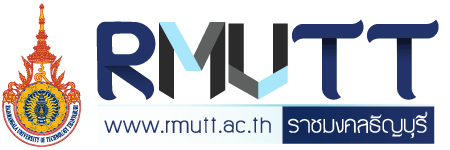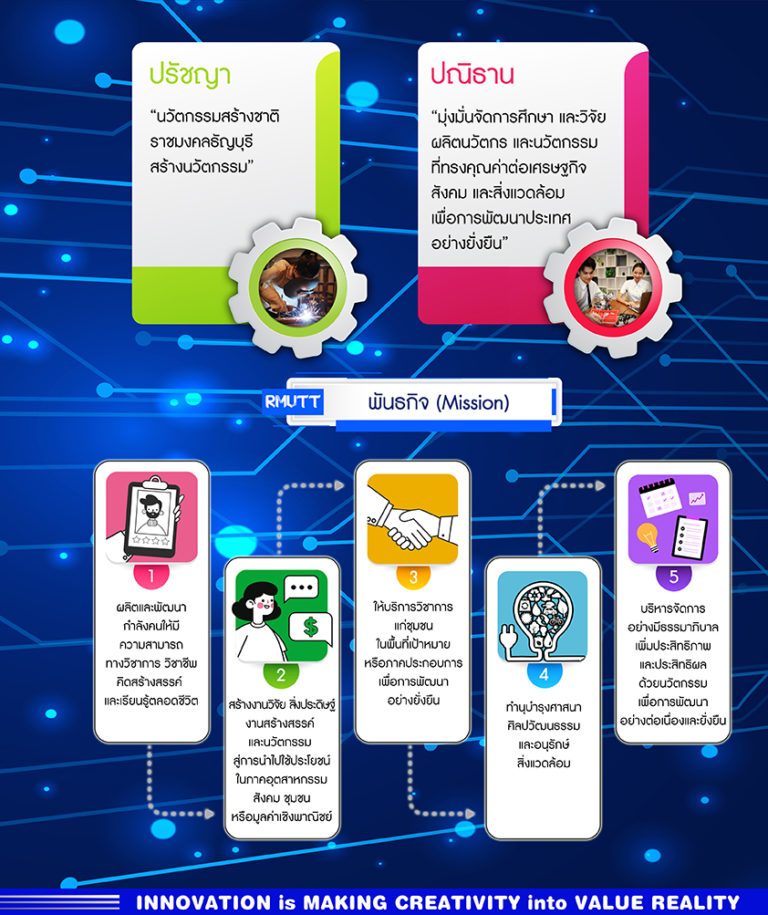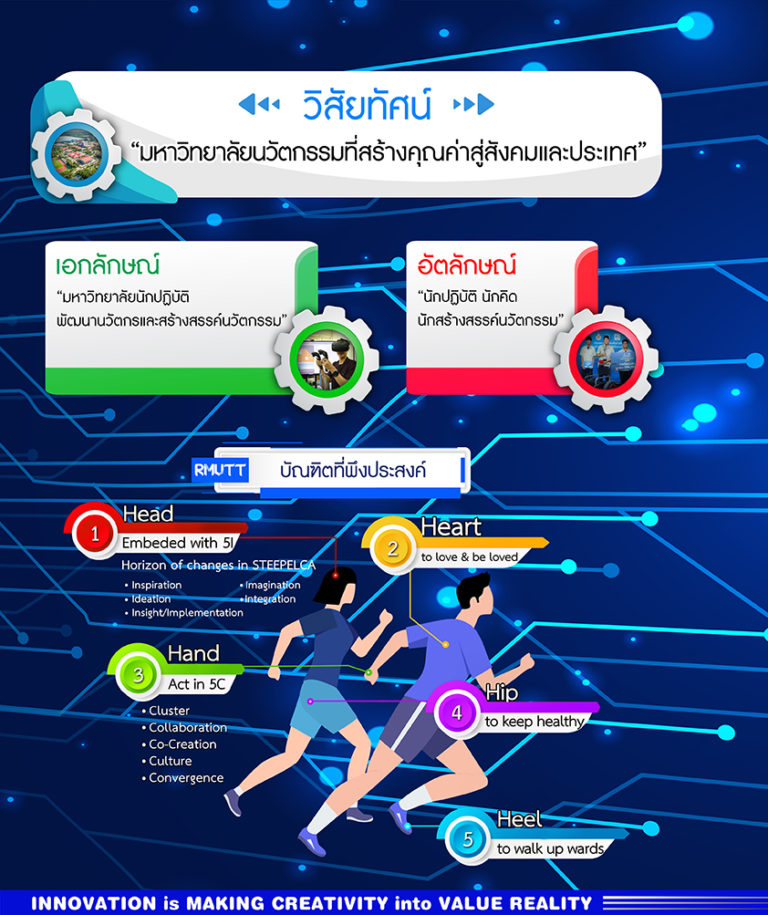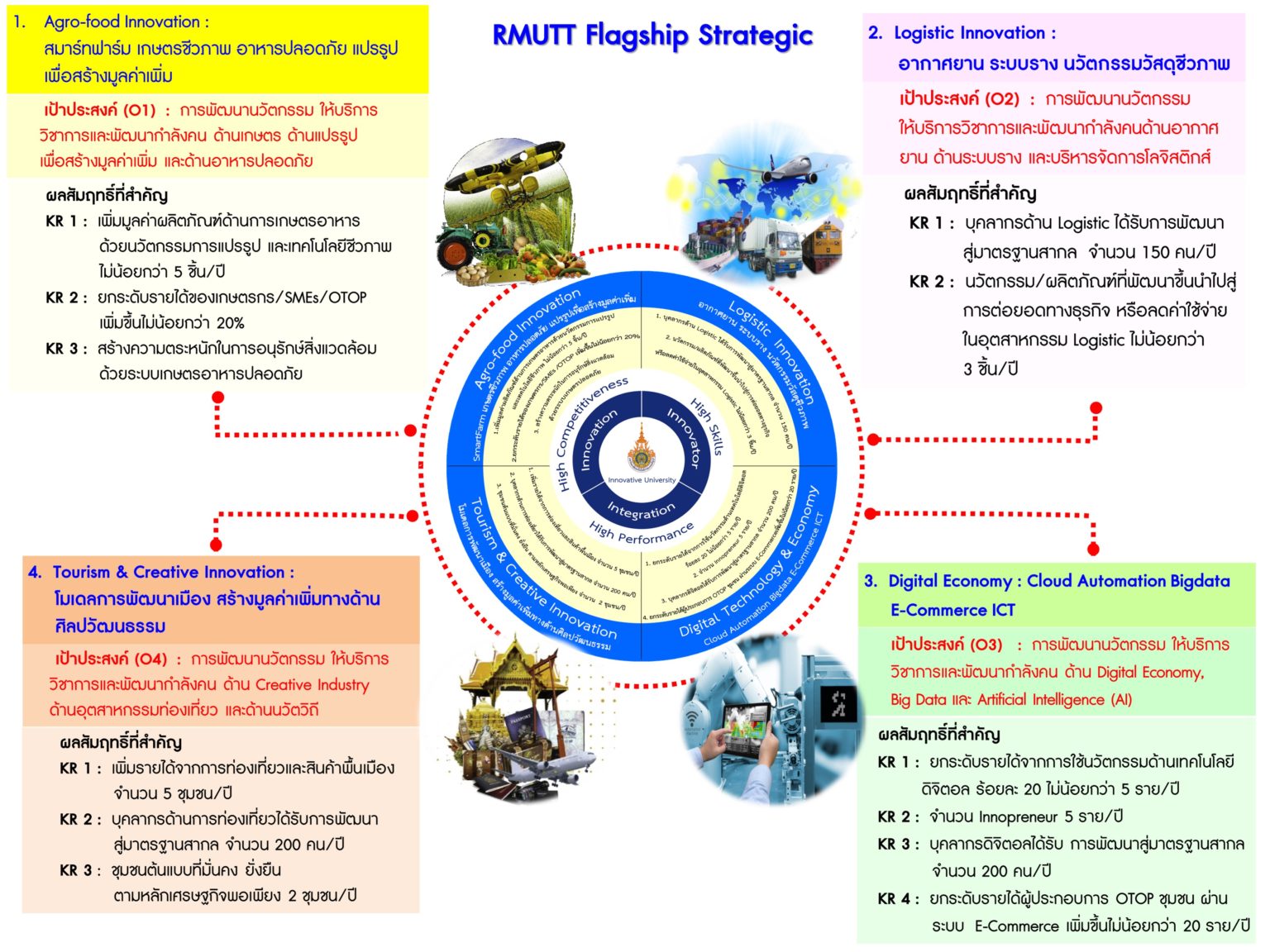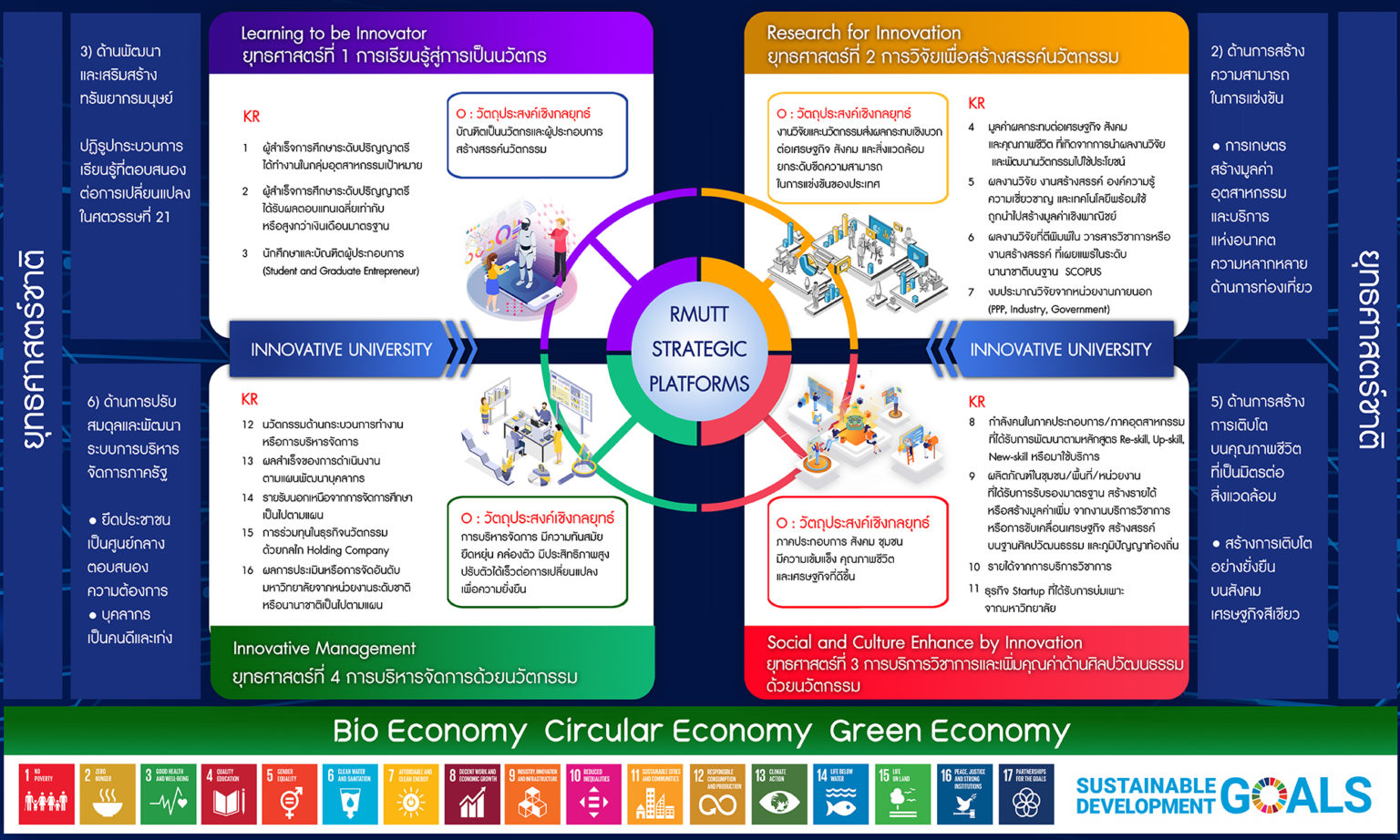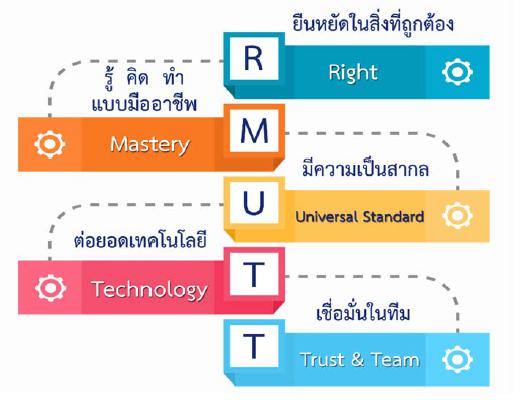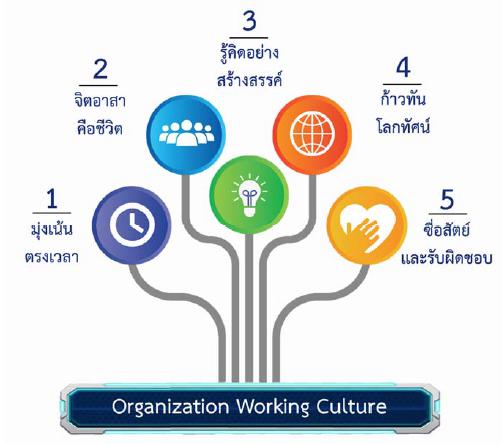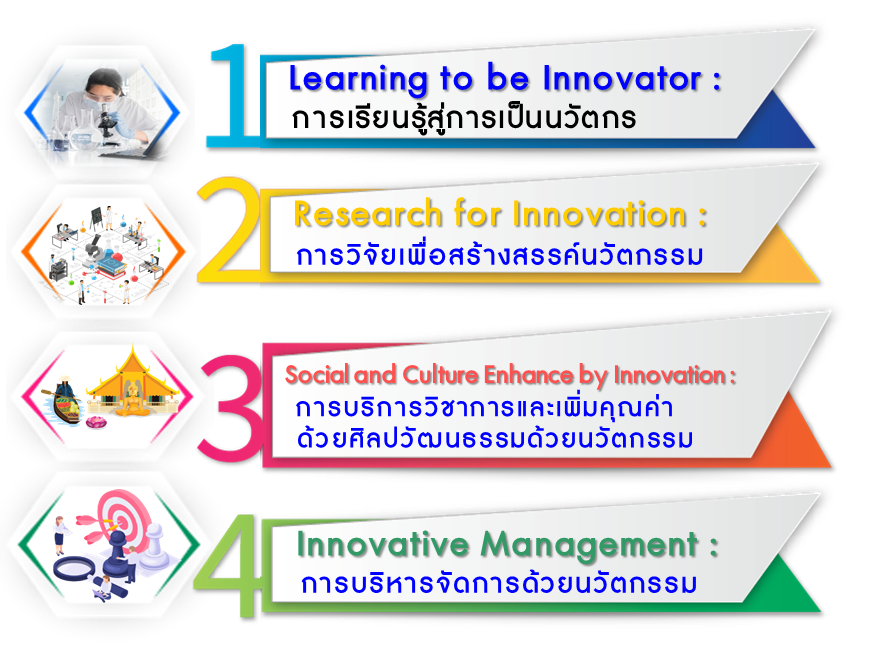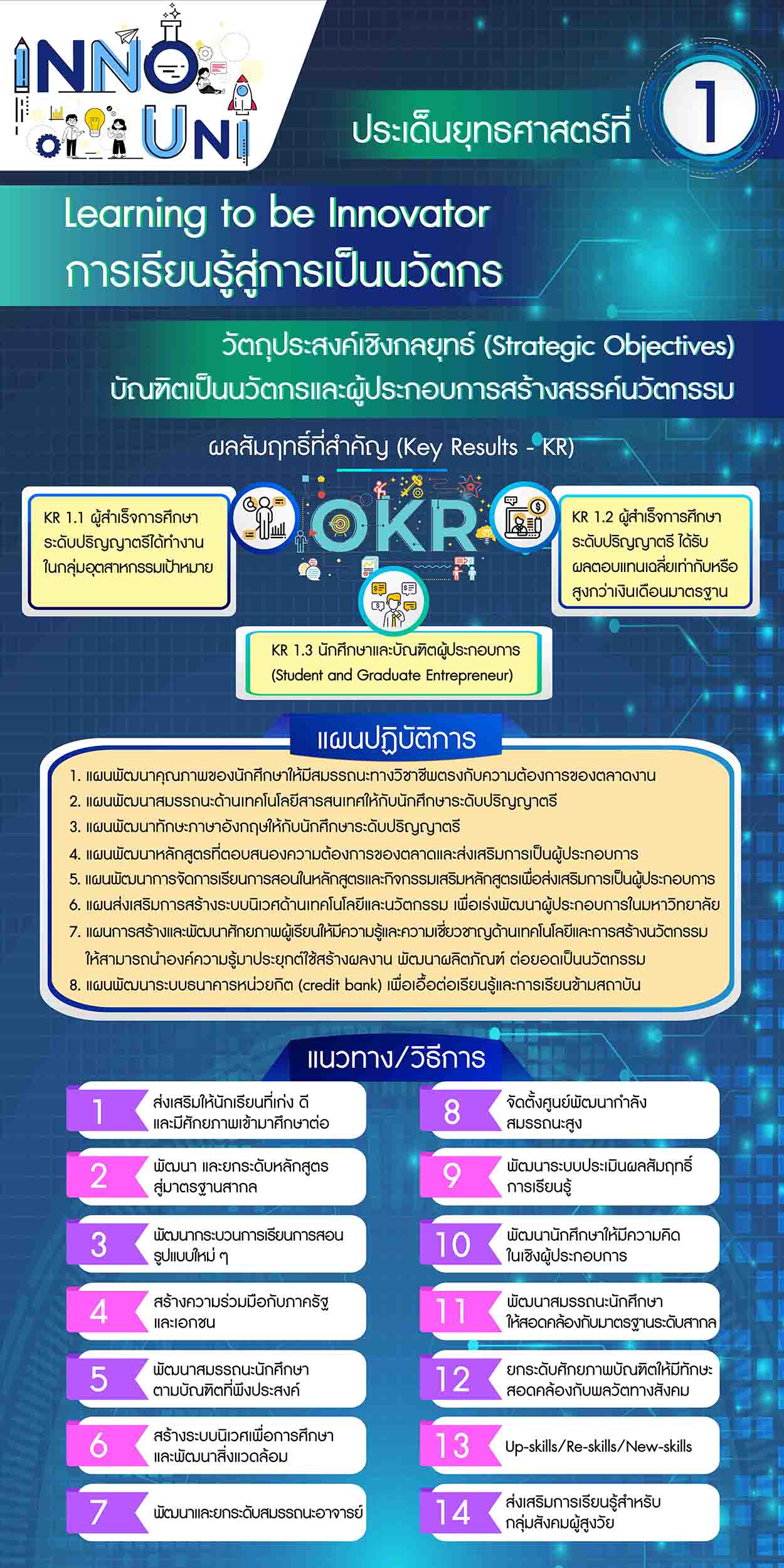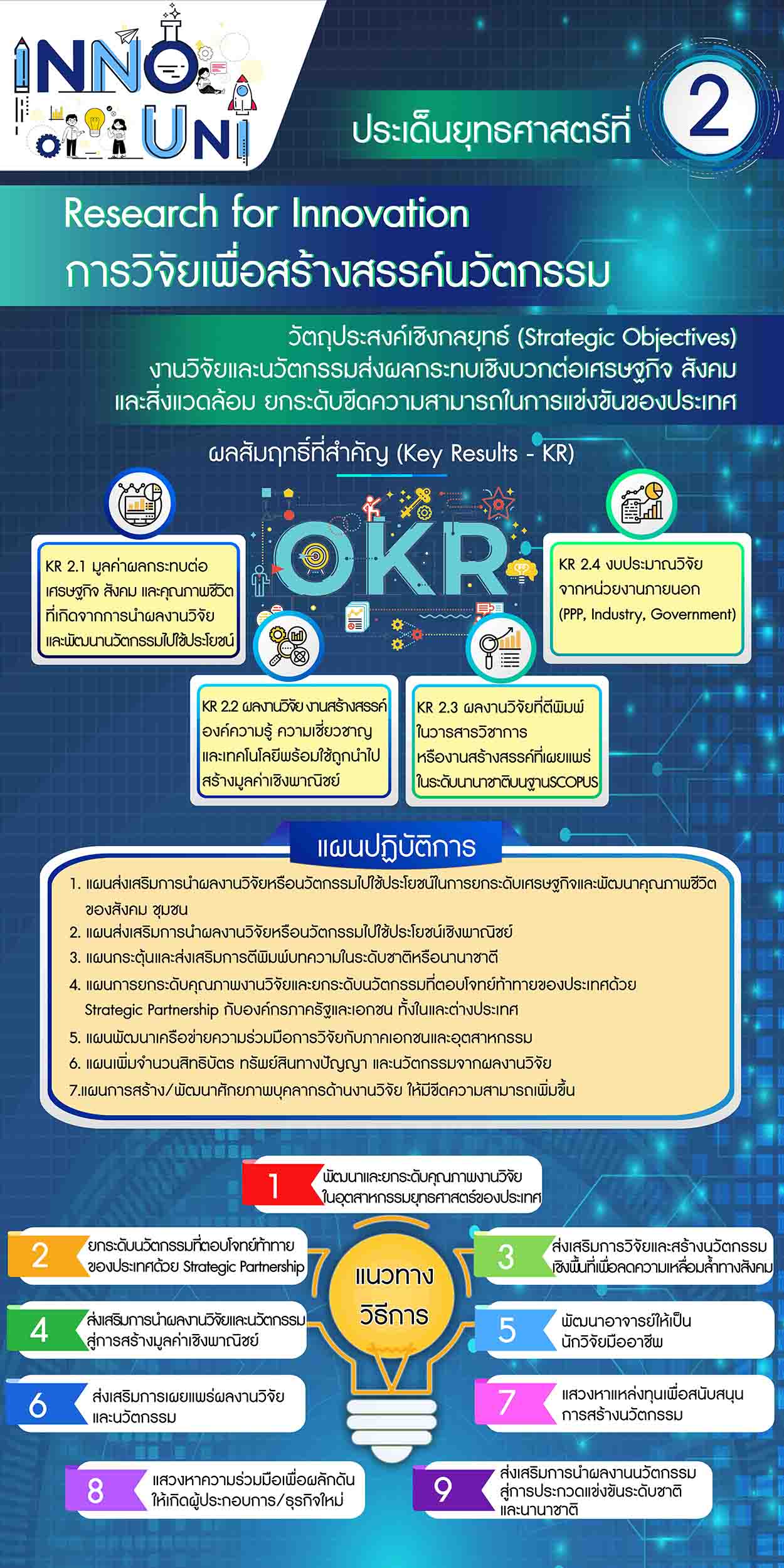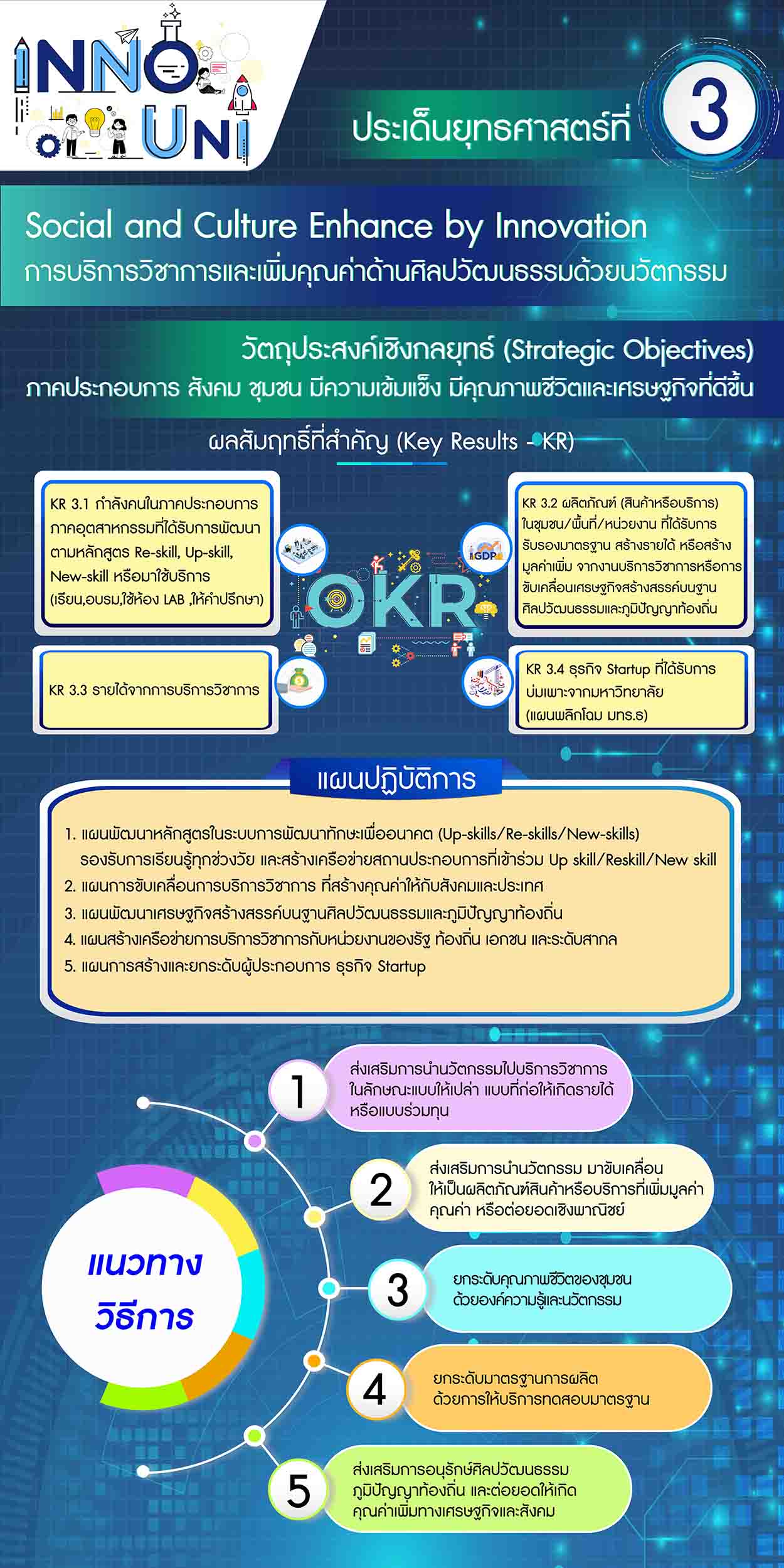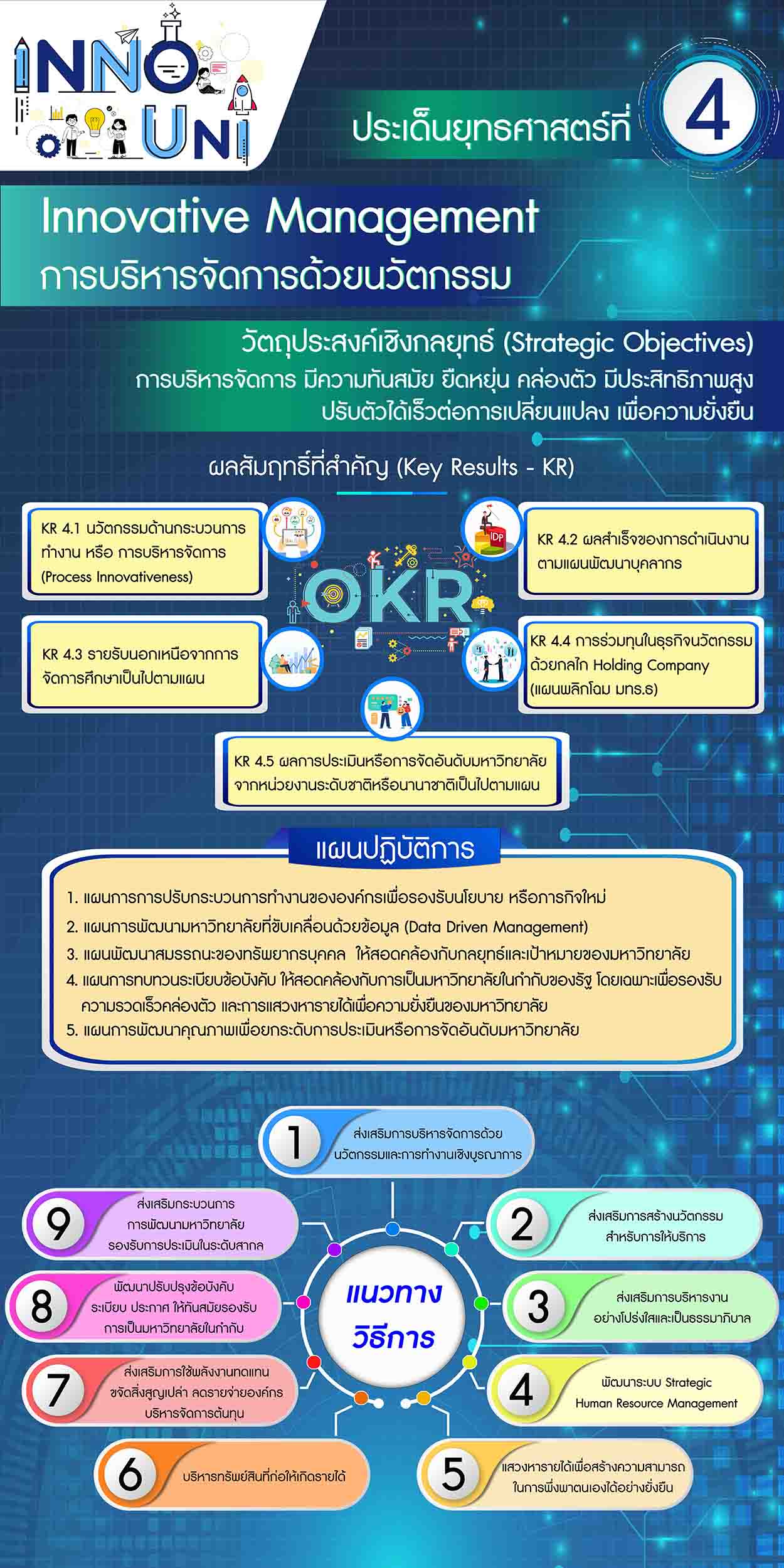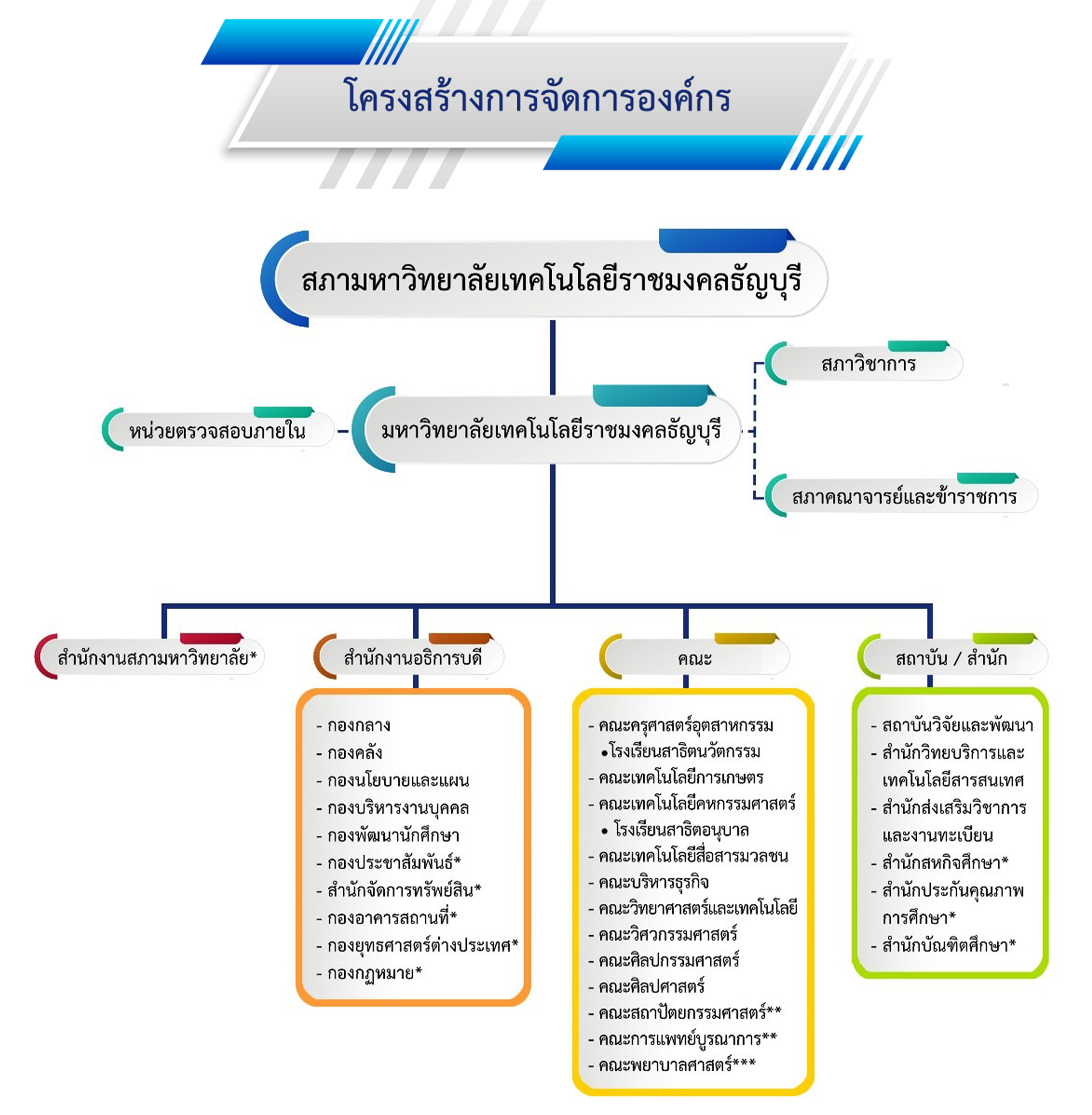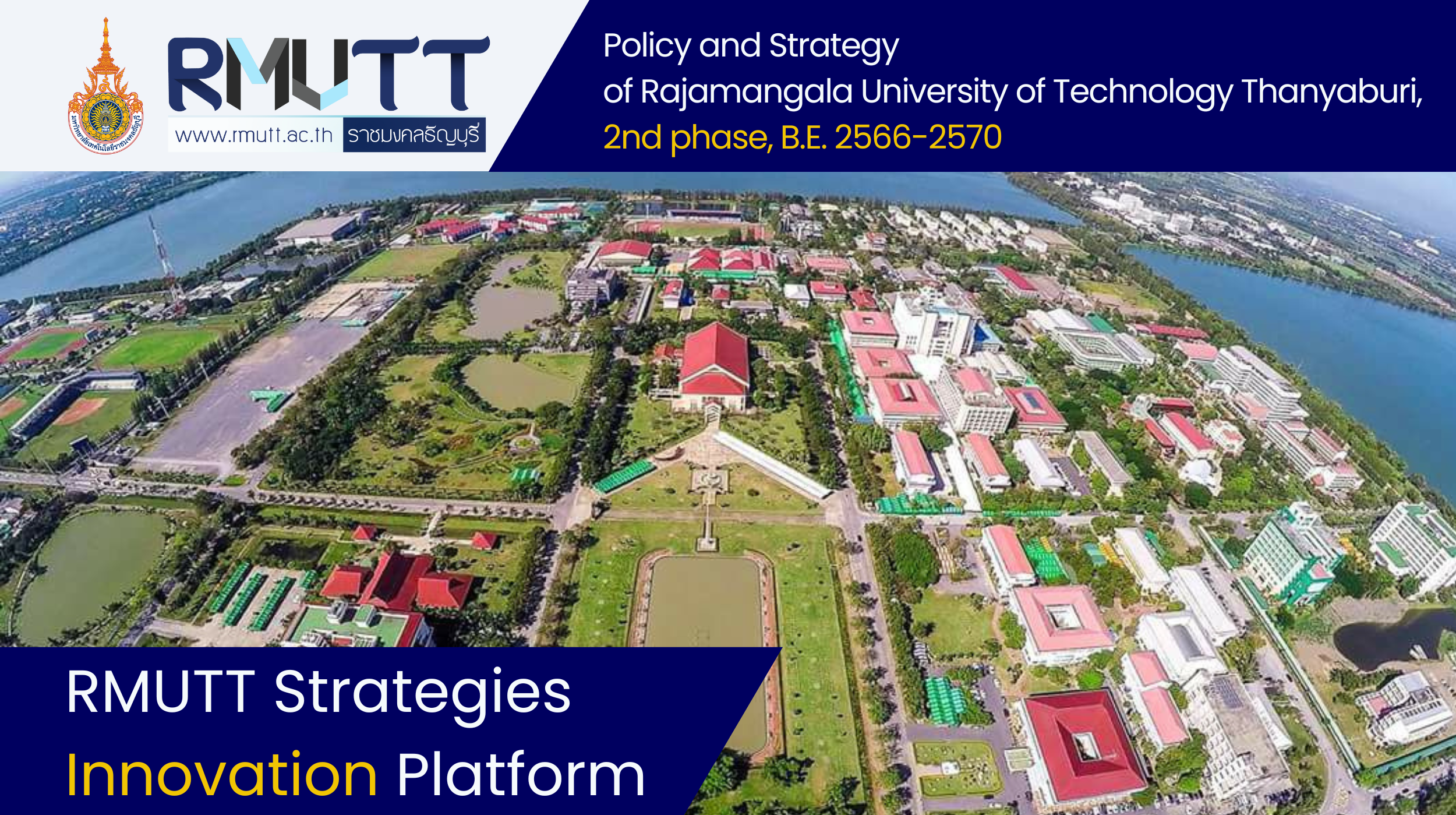
Philosophy, determination, uniqueness, identity, vision, mission, strategic issues, Rajamangala University of Technology Thanyaburi
are based on educational institution in the field of professions and technology. The objectives are to provide education, promote advanced professional and academic skills focused on practice, teaching, research, and production of professional teachers, and provide academic services in science and technology to society. Promote and preserve art and culture and conserve the environment by providing vocational education opportunities for further professional studies as a priority.
The Philosophy of innovation to develop the nation, Rajamangala ‘s University of Technology Thanyaburi innovates.
The Determination is focused on managing education and research, producing valuable innovations for the economy, society, and the environment for sustainable development.
The Mission is based on
- producing and developing human resources with academic and professional capabilities, as well as creative thinking and lifelong learning,
- creating research, inventions, creative works, and innovations for the benefit of industry, society, communities, or commercial value
- providing academic services to targeted communities or industries for sustainable development
- preserving religion, arts, culture, and conserving the environment
- governing and managing with ethical principles, increase efficiency and effectiveness through innovation for continuous and sustainable development.
The Vision is structured on the concept of an innovative university that creates value for society and the country.
The Uniqueness will be a vital part of producing a university of practitioners, developers of innovation, and creators of innovation. Whereas.
The Identity is responsible for developing practitioners, thinkers, and innovators.
The Core Value
The Organization Working Culture
The Strategic Issues of Rajamangala University of Technology Thanyaburi have been identified for driving policies and strategies in the form of 4 strategic issues, which include:
Strategic Issue 1: Learning to be an Innovator
Strategic Objectives:
Graduates become innovators and entrepreneurs who create innovations
Key Results (KR):
KR 1.1: Graduates at the bachelor’s degree level work in targeted industries
KR 1.2: Graduates at the bachelor’s degree level receive compensation equal to or higher than the standard salary
KR 1.3: Student and graduate entrepreneurs
Operational Plan:
- Develop the quality of students to have professional competence matching the job market requirements.
- Develop information technology competencies for bachelor’s degree candidates.
- Develop English language skills for bachelor’s degree candidates.
- Develop curricula that meet market needs and promote entrepreneurship.
- Develop teaching and learning management in the curriculum and extracurricular activities to promote entrepreneurship.
- Promote the creation of a technology and innovation ecosystem to accelerate the development of entrepreneurs in the university.
- Develop the capabilities of students to have knowledge and expertise in technology and innovation to apply knowledge to create works, develop products, and innovate.
- Develop a credit bank system to support cross-institutional learning.
Guidelines/Methods
- Promote the admission of talented, excellent, and high-potential students for further study.
- Develop and elevate the curriculum to international standards.
- Enhance the teaching and learning process with new formats.
- Foster collaboration with the public and private sectors.
- Develop the competencies of students in line with desired graduate attributes.
- Create an educational environment and develop the surroundings.
- Develop and elevate the capabilities of teachers.
- Establish a center for developing high competency.
- Develop an assessment system for learning performance.
- Develop students to have an entrepreneurial mindset.
- Develop student competencies to meet international standards.
- Increase the potential of graduates to possess socially-relevant skills.
- Up-skill/Re-skill/New-skills.
- Promote learning for the elderly.
Strategic Issue 2: Research for Innovation
Strategic Objectives: Research and innovation impact positively on the economy, society, and environment, enhancing the country’s competitive ability.
Key Results – KR:
KR 2.1 Economic, social, and quality of life impact from the utilization of research and innovation outputs.
KR 2.2 Commercial value from research and creative work knowledge, expertise, and technologies.
KR 2.3 Published research in international academic journals or creative work disseminated at the SCOPUS level.
KR 2.4 Research budget from external organizations (PPP, Industry, Government).
Operational Plan:
- Plan to promote the utilization of research or innovation outputs to elevate the economy and enhance the quality of life in the community.
- Plan to promote the utilization of research or innovation outputs for commercial purposes.
- Plan to stimulate and promote article publication at national or international levels.
- Plan to elevate the quality of research and innovation that meets the challenges of the country through strategic partnerships with public and private organizations, both domestic and international.
- Plan to develop research cooperation networks with the private sector and industry.
- Plan to increase the number of patents, intellectual property, and innovations from research outputs.
Guidelines/Methods
- Plan to increase the capacity of research personnel to enhance their research making abilities.
- Develop and elevate the quality of research in strategic industries of the country through Strategic Partnerships.
- Promote research and innovation.
- Claim space to reduce social inequality.
- Develop teachers to be professional researchers.
- Promote the dissemination of research and innovation outputs.
- Seek funding to support innovation creation.
- Seek cooperation to drive entrepreneurship/new businesses.
- Promote the use of innovative outputs in national and international competitions.
Strategic Issue 3: Social and Culture Enhance by Innovation: Academic services and the addition of cultural value through innovation. Strategic Objectives: Business sectors, society, and communities are stronger and have improved quality of life and economy.
Key Results (KR):
KR 3.1 Industrial sector workforce development through Re-skill, Up-skill, New-skill training or services (training, LAB usage, consulting).
KR 3.2 Products (goods or services) in the community/area/organization certified to generate income or add value from academic services or cultural-based creative economic activities.
KR 3.3 Income from academic services.
KR 3.4 Startup businesses nurtured by the university (University Transformation Plan).
Operational Plan
- Curriculum development plan to support learning at all ages and create a network of businesses participating in up-skilling/reskilling/new skills.
- Drive service-oriented academic initiatives that add value to society and the country.
- Economic development plan on the basis of local cultural and intellectual creativity.
- Build a network of academic service with government, local, private, and international organizations.
- Entrepreneurship development and startup business plan.
Methodology
- Promote innovation in academic service delivery through profitable or collaborative models.
- Drive innovation to create products or services that add commercial value.
- Enhance community quality of life through knowledge and innovation.
- Improve production standards through standardized testing services.
- Promote cultural and intellectual heritage conservation to create economic and social value.
Strategic Focus 4 Innovative Management: Innovative management objectives: Strategic Objectives: modern, flexible, efficient, and sustainable management to adapt to change.
Key Results – KR:
KR 4.1 Process innovation effectiveness.
KR 4.2 Successful implementation of personnel development plan.
KR 4.3 Revenue from educational management corresponds to the plan.
KR 4.4 Innovation business partnership through Holding Company mechanism (University Transformation Plan).
KR 4.5 University evaluation or ranking corresponds to the international standards.
Operational Plan
- Organizational process adjustment plan to support new policies or missions.
- Data-driven management plan to drive university development.
- Human resource capacity development to align with university strategies and goals.
- Regulatory review plan in compliance with state regulations to support university agility and sustainable revenue.
- Quality development plan to elevate university evaluation and ranking.
Methodology:
- Promote innovative and collaborative management.
- Foster innovation for service delivery.
- Transparent and ethical management.
- Develop strategic human resource management.
- Seek sustainable income for self-reliance.
- Manage assets to generate revenue.
- Promote renewable energy use to reduce operational costs.
- Modernize regulations to align with university status.
- Support university development for global evaluation.
 นโยบายและยุทธศาสตร์ มหาวิทยาลัยเทคโนโลยีราชมงคลธัญบุรี ระยะที่ 2 พ.ศ.2566 – 2570 (88.4 MiB)
นโยบายและยุทธศาสตร์ มหาวิทยาลัยเทคโนโลยีราชมงคลธัญบุรี ระยะที่ 2 พ.ศ.2566 – 2570 (88.4 MiB)
